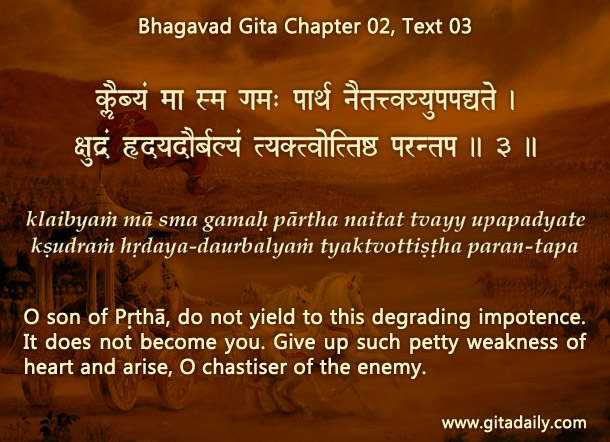
Some people ask, “The Bhagavad-gita is said to be a spiritual book, yet it endorses violence. Isn’t that anti-spiritual?”
No, because the Gita is a spiritual book spoken in an emergency social context. Here’s an example to understand that social context.
Suppose an arrested sex abuser who has shown not the slightest sign of remorse or reformation is released without undergoing the due process of justice – and that abuser goes on a rampage abusing many more people. Naturally, such a release would be a form of violence.
Now turn the situation around and assume that such a criminal is in charge of society. One shudders to think about the kind of atrocities the people under such a ruler would have to undergo. If removing such a ruler requires violence, then violence is necessary for peace. Letting such a ruler continue on in power in the name of peace would allow the reign of violence to continue unabated.
The Gita is spoken in such a social emergency wherein atrocious rulers had captured power by unscrupulous means. In such a situation it (02.03) deems pacifism as weak-mindedness and calls for assertive action.
And the Gita’s unique genius is the revelation of the path of devotion that enables one to spiritualize assertive action in the world, as it (08.07) indicates. Rather than calling all spiritual seekers to social warfare, the Gita uses the extreme setting of social warfare to demonstrate that no situation is impossible to spiritualize. Its wisdom can empower seekers to ensure that no situation compromises their spirituality – they can intelligently and proactively find a way to spiritualize that situation.
This universal availability of spirituality is the enduring message of the Gita – a message dramatically illustrated through the seemingly anti-spiritual setting of a war.
Explanation of article:


Hare Krishna !
Very nice article explaining why some times violence is needed in order to establish peace and how path of devotion enable us to spiritualized assertive action which is necessary.The whole Bhagwad Gita is based on this principle.
Excellant explaination and narration of spiritual war